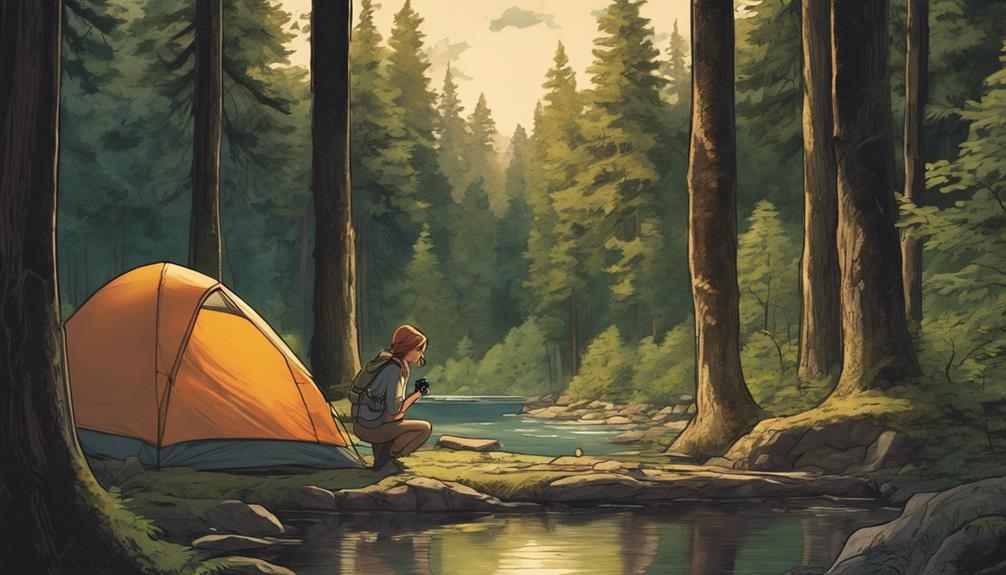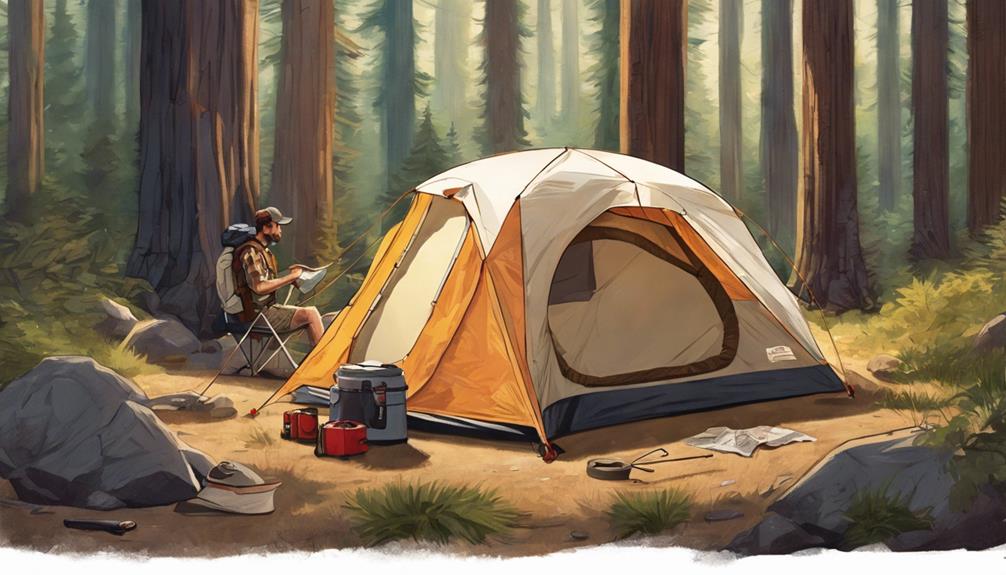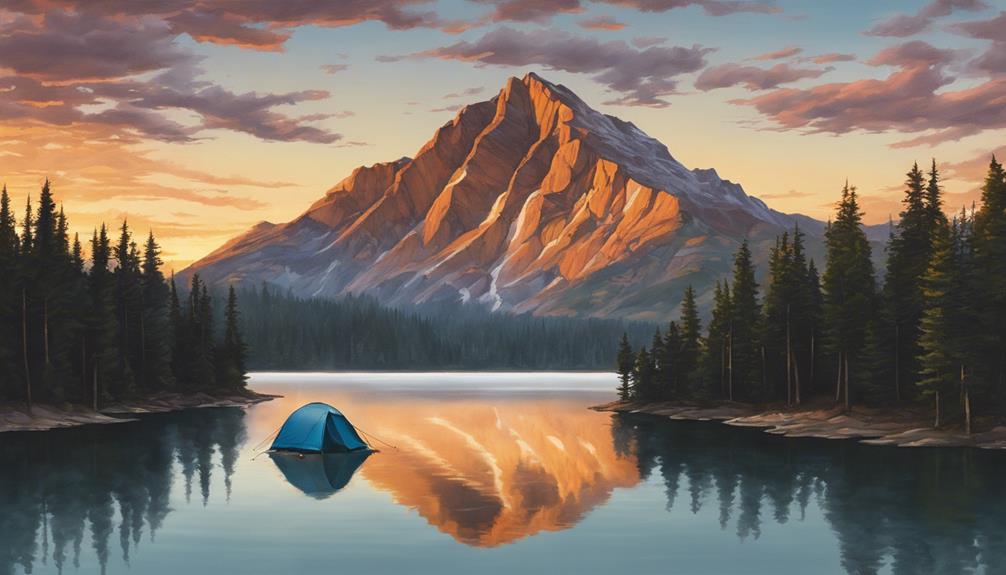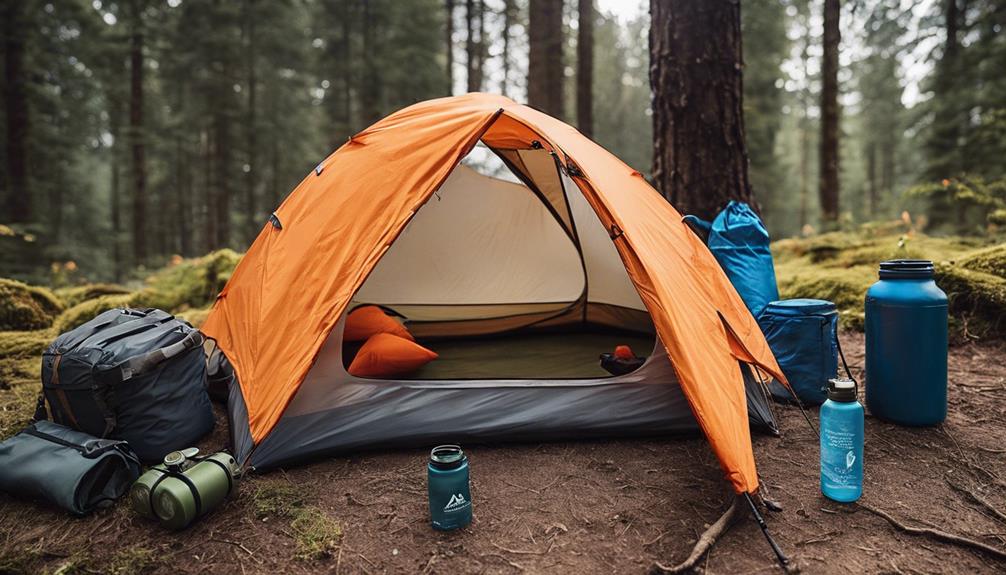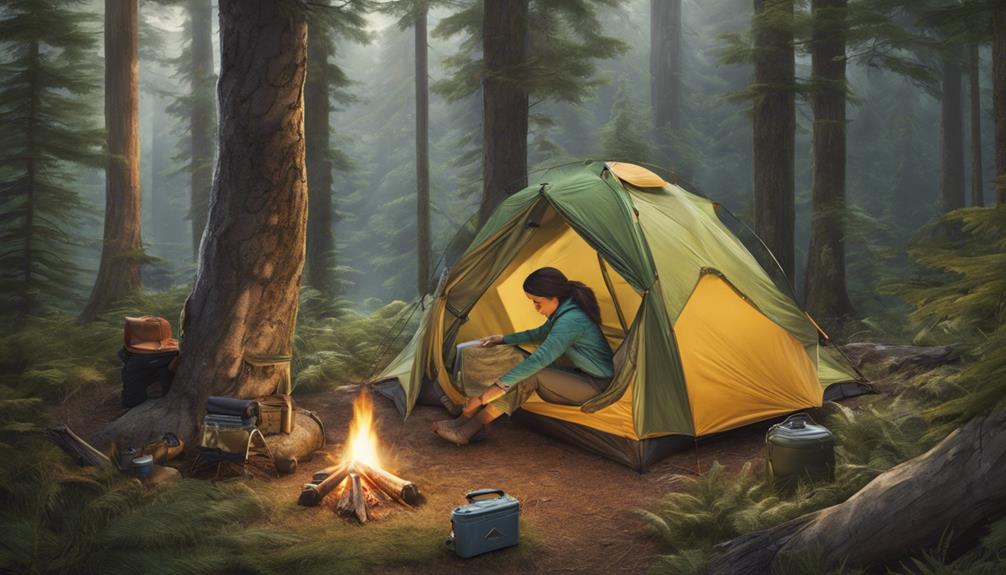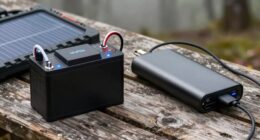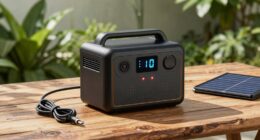For a solo female camper venturing on an outdoor escapade, safety should be the utmost priority. Proficiency in outdoor activities, meticulous planning, and knowledge of essential supplies are crucial for a rewarding experience. Selecting the ideal campsite location, taking into account amenities, level of seclusion, comfort, and expertise, is essential for a successful journey. It is imperative to pack wisely with essential camping equipment, such as a high-quality tent, warm sleeping bag, reliable stove, appropriate clothing, and a well-equipped first aid kit. Meal planning should consist of dehydrated backpacking meals, non-perishable snacks, and easy-to-cook options with a portable stove. Being mindful of wildlife encounters, animal behavior, and habitat safety is also crucial, therefore carrying bear spray, making noise while hiking, and properly storing food are recommended for a secure outdoor adventure. This guide lays a strong foundation for solo female campers to relish their time in the great outdoors.
Key Takeaways
- Prioritize safety through competency in outdoor skills and proper planning.
- Choose a campsite based on facilities, solitude, and experience level.
- Pack essential gear like a tent, sleeping bag, stove, clothing, and first aid kit.
- Plan meals with dehydrated foods, snacks, and easy-to-cook options.
- Stay safe from wildlife by understanding their behavior, proper food storage, and carrying bear spray.
Essential Safety Tips for Solo Female Campers
When embarking on a solo camping trip as a woman, prioritizing safety is paramount to ensure a rewarding outdoor experience. Competency in outdoor skills is key, especially when camping alone.
Federal land, with its low crime rates, offers a secure environment for solo female campers. Personal stories from numerous successful solo camping experiences by women highlight the importance of proper planning and preparation for a safe trip.
It's essential to be well-versed in outdoor skills such as setting up a tent, building a fire, and navigating trails. Understanding how to handle emergencies and being equipped with necessary supplies are crucial for solo camping safety.
Choosing the Right Campsite Location

Selecting the ideal campsite location plays a crucial role in ensuring a successful and enjoyable solo camping experience. When choosing a campsite, it's essential to consider the facilities available, the level of solitude offered, your comfort level, and your camping experience. National parks can provide stunning natural settings, perfect for those seeking a balance of nature and amenities. On the other hand, remote camping locations demand thorough preparation but offer unparalleled solitude and a true wilderness experience. Your campsite location should align with your safety concerns and preferences to ensure a smooth outdoor adventure. Making the right choice can significantly impact your overall enjoyment and safety during your solo camping experience.
| Campsite Location | Solitude Levels | Camping Experience |
|---|---|---|
| National Parks | Moderate | Beginner/Intermediate |
| Remote Camping | High | Advanced |
| Developed Campgrounds | Low | All Levels |
Packing Smart: Must-Have Camping Gear
To ensure a successful camping trip, it's essential to pack smart with must-have camping gear that will enhance your outdoor experience and keep you prepared for various situations.
A high-quality tent provides shelter from the elements, while a warm sleeping bag ensures a cozy night's sleep. Don't forget a reliable camping stove for cooking meals. Proper clothing and footwear are crucial for comfort and protection in changing weather conditions.
Pack non-perishable food items and water purification tools to stay nourished and hydrated throughout your adventure. Navigation tools such as a compass are essential for orienting yourself in unfamiliar terrain.
Lastly, always carry a well-equipped first aid kit to address any minor injuries or emergencies that may arise while camping. By including these key items in your gear, you'll be ready for whatever the great outdoors throws your way.
Solo Camping Meal Planning Ideas
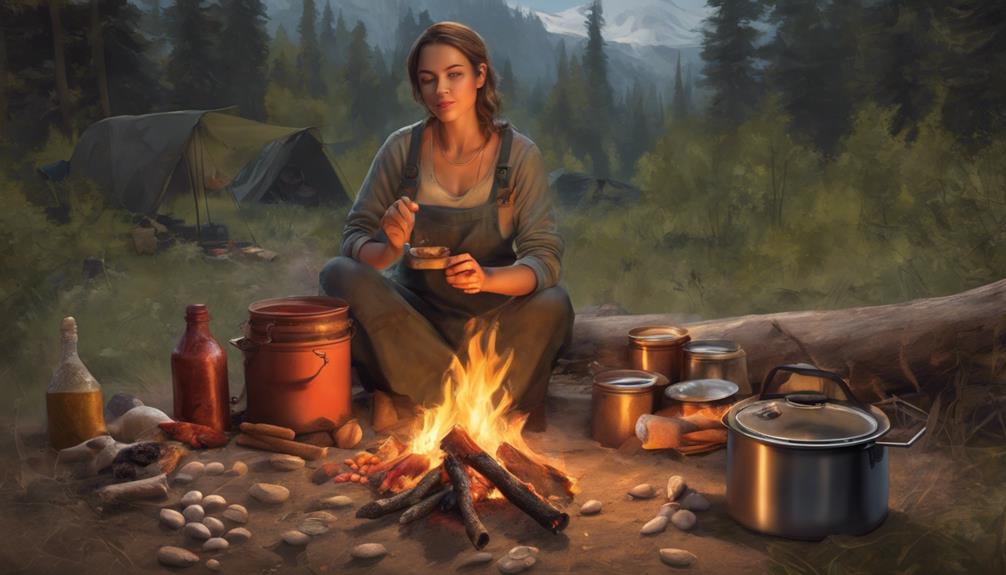
For a successful solo camping experience, meal planning is key to ensuring you have lightweight and nutritious options that provide maximum energy for your outdoor adventures. When planning your solo camping meals, consider the following:
- Backpacking Meals: Opt for dehydrated or freeze-dried meals for easy preparation and minimal cleanup. These lightweight options are perfect for solo campers looking to save on weight and space in their backpacks.
- Non-Perishable Snacks: Pack non-perishable items like nuts, granola bars, and dried fruits for quick snacks on the go. These snacks provide a convenient source of energy during your outdoor activities without the need for refrigeration.
- Portable Stove: Choose easy-to-cook meals that can be prepared using a portable stove or camping grill. This cooking gear allows you to whip up hot meals wherever you are, adding a touch of comfort to your solo camping experience while keeping things simple and efficient.
Wildlife Encounters: How to Stay Safe
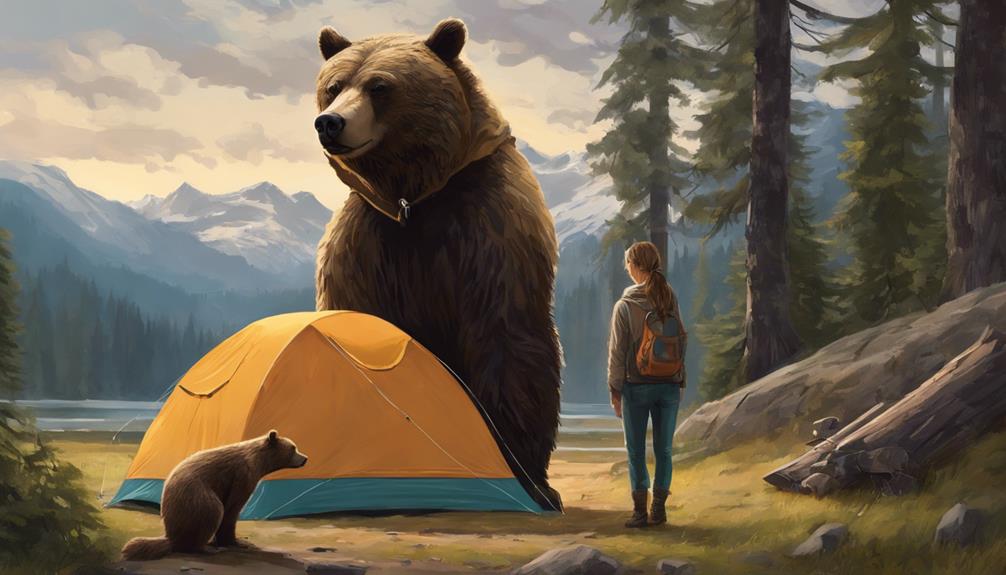
When venturing into the wilderness for solo camping, being aware of potential wildlife encounters is paramount for ensuring a safe and enjoyable experience. Wildlife encounters are rare during solo camping trips, but understanding animal behavior and habitats can prevent surprises. Proper food storage practices are crucial as they minimize wildlife attraction to your campsite. Remember to carry bear spray and know how to use it; this can be a lifesaver in case of a close encounter with a bear or other wildlife. Additionally, making noise while hiking is a simple yet effective way to alert wildlife to your presence, reducing the likelihood of startling them. Below is a table summarizing key tips for wildlife safety during solo camping:
| Wildlife Safety Tips | Description |
|---|---|
| Understand Behavior | Learn about animal behavior and habitats to avoid surprises |
| Proper Food Storage | Store food securely to prevent attracting wildlife |
| Carry Bear Spray | Essential for safety in case of close wildlife encounters |
Frequently Asked Questions
Is It Safe for Girls to Go Camping Alone?
Yes, it's safe for girls to go camping alone. We've found that low crime rates on federal land provide a secure environment.
Competency in outdoor skills is key for ensuring safety. Many women have had successful solo camping experiences, highlighting the safety of such trips.
Personal stories show the precautions taken by women while camping solo. Proper planning is crucial for a secure and enjoyable experience.
How to Camp as a Single Woman?
Camping as a single woman requires careful planning and a proactive mindset. We prioritize safety by sharing our itinerary, packing essentials, and mastering basic outdoor skills.
Confidence and situational awareness are key components of a successful solo camping experience. Embracing the adventure with caution and preparedness ensures an enjoyable time in the great outdoors.
What to Do While Solo Camping?
While solo camping, we embrace the freedom to explore, reflect, and connect with nature. Engage in activities like hiking, fishing, or stargazing to immerse in the wilderness.
Practice mindfulness for tranquility and journal your experiences for personal growth. Learn survival skills like fire-making and navigation for self-sufficiency.
Connect with fellow campers for a sense of community. These experiences enrich our journey and create lasting memories.
How Do You Camp Alone in the Wilderness?
When camping alone in the wilderness, we prioritize safety by informing others of our exact location and expected return time. Familiarizing ourselves with local wildlife, potential hazards, and emergency procedures is crucial.
Carrying essential gear like a first aid kit, navigation tools, and emergency supplies ensures self-sufficiency. Practicing Leave No Trace principles minimizes environmental impact and respects nature during our solo wilderness adventures.
What Safety Tips Should I Follow as a Solo Female Camper?
When creating a solo car camping checklist, safety should be a top consideration for female campers. Always let someone know your exact camping location and expected return time. Avoid camping in remote areas and be aware of your surroundings. Trust your instincts and have emergency contacts readily available.
Conclusion
As the sun begins to set and the shadows grow longer, the crackling campfire beckons us closer. The night is still and quiet, with only the sounds of nature surrounding us.
But as we settle in for the night, a rustling in the bushes catches our attention. Our hearts race as we wait to see what emerges from the darkness.
Remember, solo camping is an adventure full of surprises – are you ready for the unknown?

